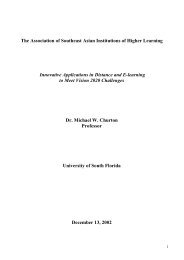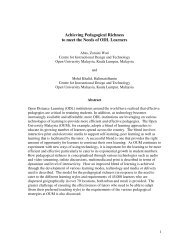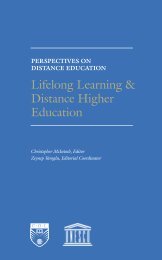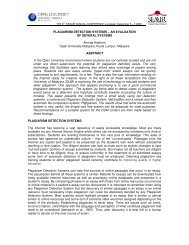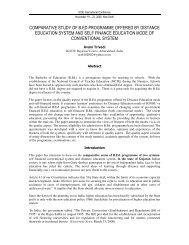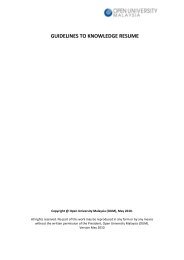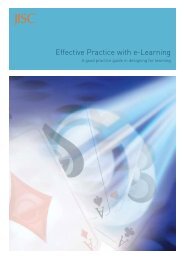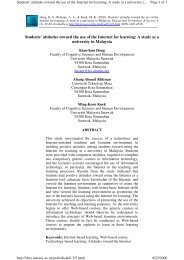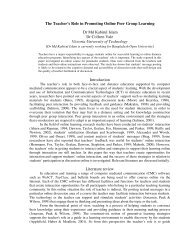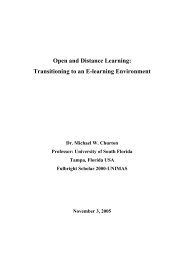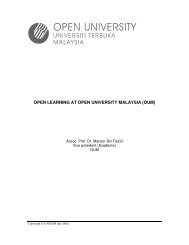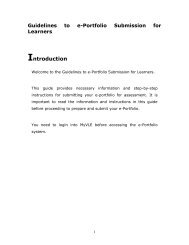e-learning readiness - Asia Pacific Region - Open University Malaysia
e-learning readiness - Asia Pacific Region - Open University Malaysia
e-learning readiness - Asia Pacific Region - Open University Malaysia
- No tags were found...
You also want an ePaper? Increase the reach of your titles
YUMPU automatically turns print PDFs into web optimized ePapers that Google loves.
6.2 RecommendationsBased on the findings of the study, a number of recommendations can bemade with regards to the future of E-<strong>learning</strong> in <strong>Malaysia</strong>. The primaryarea of development for harnessing the E-<strong>learning</strong> potential is capacitybuilding, which refers to the development of individuals andorganisations in order to attain the national goal of becoming aneducational hub in the region. Thus, E-<strong>learning</strong> will feature as a majorcontributor to knowledge building and lifelong <strong>learning</strong> in formal,informal and non-formal <strong>learning</strong> environments, while E-<strong>learning</strong><strong>readiness</strong> would be a necessary ingredient in the realisation of such agoal.Recommendations for the enhancement of E-<strong>learning</strong> <strong>readiness</strong> have beenmade with reference to each of the following areas:1. Human Resource Development2. Research and Development3. Infrastructure4. Infostructure5. Institutional Framework6. Policy Initiatives7. BenchmarkingDetails pertaining to each of these areas follow:6.2.1 Human Resource DevelopmentThe primary goal of human resource development in relation to E-<strong>learning</strong> is to produce local expertise in developing and deployingeffective E-<strong>learning</strong> applications. In this sense, the term ‘humanresource’ refers to policy makers, providers and enablers. Further, thepotential of receivers has to be developed so that there is a ready poolof knowledge workers in the future. The attainment of expertise isessential to the provision of E-<strong>learning</strong>, as this will propel policymakers, providers and enablers to become authorities in E-<strong>learning</strong>,and to build a reputation for their skills and experience in deployingeffective E-<strong>learning</strong> plans in their organisations.To realize these aims, the following recommendations are forwarded:-(a) Appoint a Chief Learning Officer (CLO) in every educationalorganisation who will provide E-leadership to strategise andimplement all E-<strong>learning</strong> initiatives in the institution. The CLOwould implement a change management programme to cultivatean E-<strong>learning</strong> culture among all staff in the institution. He or sheshould be an educationist with training especially in the field ofinstructional/educational technology in particular.(b) Train a core group of E-<strong>learning</strong> experts within each institution sothat they may become trainers of international calibre.Joint Study by MECW and OUM 103



